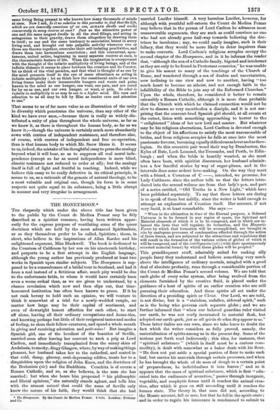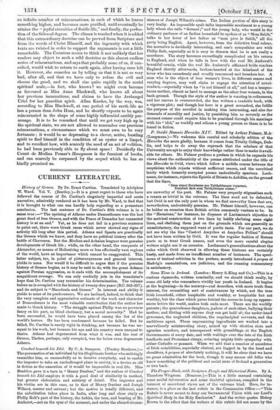THE HONEYMOON.*
THE rhapsody which under the above title has been given to the public by the Count de Medina Pomar may be fitly described as a spiritist romance, having been written appar- ently for the express purpose of ventilating some of the queer doctrines which are held by the most advanced Spiritualists, or as they themselves prefer to be called, Sphitists ; those, in short, who believe in the inspirations of Allan Kardec and his enlightened exponent, Miss Blackwell. The book is dedicated to the Countess of Caithness by her son on his nineteenth birthday, and purports to be a first attempt in the English language, although the young author has previously produced at least two works in Spanish upon similar subjects. The Honeymoon is sup- posed to be a remembrance of a bridal tour in Scotland, and had it been a real instead of a fictitious affair, much pity would be due to the unfortunate bride, to whom it would have certainly been even a worse ordeal than, as we are given to understand, by a chance revelation which now and then slips out, that time- honoured institution has often been known to prove. If it be not rank heresy to hold such an opinion, we will venture to think it somewhat of a trial for a newly-wedded couple, no matter how large may be their capital of sentiment, and even of downright honest affection for each other, to start off alone, leaving all their ordinary occupations and .home-ties, and knowing perhaps but little of their reciprocal tastes and modes of feeling, to shun their fellow-creatures, and spend a whole month in giving and receiving adoration and petit-soins But imagine a Spanish girl, one of the loveliest of the beauties of • Seville, married soon after leaving her convent to such a prig as Lord Carlton, and immediately transplanted from the sunny skies of Andalusia, to smoky, dingy Glasgow, where, by way of making things pleasant, her husband takes her to the cathedral, and seated in -that cold, damp, gloomy, soul-depressing edifice, treats her to a disquisition upon the religion of John Knox, and the doctrines of the Brahmists (sic) and the Buddhists. Conchita is of course a Roman Catholic, and so, as she believes, is the man she has married ; but when she hears him propound "his philosophic and liberal opinions," she naturally stands aghast, and tells him with the utmost naiveté that could the nuns of Seville only know the nature of his faith, they would think that she had * The Honeymoon. By the Count de Medina Pomar. 2 vols. Loudon: Trilbner and Co. married Lucifer himself. A very harmless Lucifer, however, for although with youthful self-esteem the Count de Medina Pomar may believe that in the person of Lord Carlton he advances most unanswerable arguments, they are such as could convince no one who had not already gone half-way towards believing the doc- trines he inculcates ; nay, we could easily imagine, such is their fallacy, that they would be more likely to deter inquirers than to make converts. Lord Carlton's religious scruples occupy the second chapter of the Honeymoon, and in it he informs the reader that, "although the son of a Catholic family, bigoted and intolerant as they are only to be found in Protestant countries," he was unable to give his assent to many of the teachings of the Church of Rome, and wandered through a sea of doubts and uncertainties, now inclining to one view and now to another, having "too much heart to become an atheist, and not enough faith in the infallibility of the Bible to join any of the Reformed Churches." Upon the whole, therefore, he considered it better to remain ostensibly a Roman Catholic, although it is more than probable that the Church with which he claimed connection would not be slow to disown so very unorthodox a disciple, and it is not sur- prising that the convent-bred Spanish girl should, at all events at the outset, listen with something approaching to horror to the " enlightened " ideas of her new lord and master. But whatever may be his religious aberrations, Lord Carlton is devoted enough to the object of his affections to satisfy the most unreasonable of brides, and from religious scruple's he falls at once into the most passionate fervour, becoming equally ridiculous as lover and as theo - logian. So this eccentric pair wend their way by Dumbarton, the Kyles of Bute, Loch Lomond, the Trossachs, and Perth, to Edin- burgh; and when the bride is heartily wearied, as she must often have been, with spiritist discourses, her husband adminis- ters a few fanciful stories by way of sugar-plums, and in the intervals does some ardent love-making. On the way they meet with a friend, a Countess of C —, intended, we presume, for Lady Caithness, since the author tells us that the letters intro- duced into the second volume are from that lady's pen, and part of a series entitled, "Old Truths in a New Light," which have been published separately. To say that these letters are daring is to speak of them but mildly, since the writer is bold enough to attempt an explanation of Creation itself. Her account, if not very lucid, is at least remarkable. She says :— " When in the nitimation in time of the Eternal purpose, a Sidereal Universe is to be formed in any region of space, the Spiritual and Material elements of which it is to be composed, and in which are in- herent the laws that will regulate its formation, and the Magnetic Forces by which that formation will be accomplished, are brought in situ by analogous processes of condensation effected through the action of these forces, and are subjected to the attractions and repulsions that will result in the formation of the various orders of globes of which it will be composed, and of the intelligencies (sic) (with their spontaneously accreted material forms) by which those globes will be peopled."
This grandiloquent stuff, admirably suited for making silly people fancy they understand and believe something very much above the intelligence of ordinary mortals, mingled with a good deal of absolute profanity, runs through a considerable portion of the Count de Medina Pomar's second volume. We are told that each globe of every solar system, after being evolved from the elements furnished by the creative fluid, is placed under the guidance of a host of spirits of an earlier creation who are still pursuing their education. And these spirits all act under the direction of a presiding spirit or Christ. Our Lord, we are told, is not divine, but is a "stainless, unfallen, sidereal spirit," such as is the being who governs each separate globe ; and we are further informed that "when our beloved guardian ruler visited our earth, he was not really incarnated in material flesh, but adopted our earth-garb, just as all spirits do when they appear to us." These latter italics are our own, since we take leave to doubt the fact which the writer considers so fully proved, namely, the materialisation of spirits among us in the present day. Some of the notions pat forth read ludicrously ; this idea, for instance, that "spiritual substance" (which in itself must be a curious com- modity), is dealt with somewhat as a baker deals with his flour. "He does not put aside a special portion of flour to make each loaf, but carries his materials through certain processes, and when he has brought the whole of the mass of dough to a certain point of preparedness, he individualises it into loaves ;" and so it appears that the mass of spiritual substance, which is first " edu- • cated into the rudiments of accretion," passes through inorganic, vegetable, and zoophytic forms until it reaches the animal crea- tion, after which it goes on still ascending until it reaches the human state. The theory is, that man did not, according to the Mosaic account, fall as man, but that he fell in the spirit-state ; and in order to regain his innocence is condemned to submit to an infinite number of reincarnations, in each of which he learns something higher, and becomes more purified, until eventually he attains the "joyful eternities of fluidic life," and finally, the perfec- tion of the Sidereal degree. The climax is reached when it is added that this extraordinary doctrine can be proved from Scripture and from the words of Christ Himself, and the ingenuity with which texts are twisted in order to support the arguments is not a little remarkable. The Countess seems to think it not unlikely that her readers may object to such a wild doctrine as this almost endless series of reincarnations, and says that probably none of us, if con- sulted, would wish to return to earth again, after having once left it. However, she consoles us by telling us that it is not so very bad, after all, and that we have only to refuse the evil and choose the good, and we shall rise quite rapidly in the social spiritual scale,—in fact, who knows? we might even become as favoured as Miss Anna Blackwell, who knows all about her previous incarnations, and claims to have the Archangel ITriel for her guardian spirit. Allan Kardec, by the way, was, according to Miss Blackwell, at one period of his earth-life no less a person than John Huss, and he shortly expects to be again reincarnated in the shape of some highly influential earthly per- sonage. It is to be remarked that until we get very high up in the spiritual state, we are not allowed to remember our previous reincarnations, a circumstance which we must own to be very fortunate ; it would be so depressing to a clever, active, bustling spirit to find himself in the condition of an oyster or a limpet, and to recollect how, with scarcely the need of an act of volition, he had been previously able to fly about apace! Decidedly the Count de Medina Pomar's Honeymoon is the funniest of books, and can scarcely be surpassed by the sequel which he has so kindly promised us.







































 Previous page
Previous page